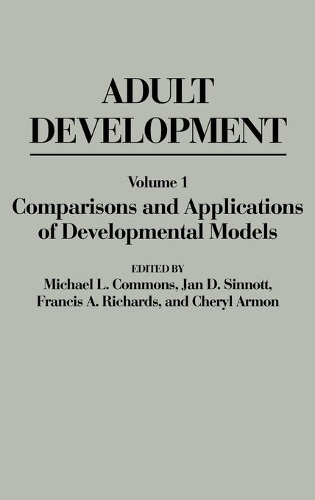
Adult Development: Volume I: Comparisons and Applications of Developmental Models
(Hardback)
Available Formats
Publishing Details
Adult Development: Volume I: Comparisons and Applications of Developmental Models
By (Author) Michael L. Commons
Edited by Jan D. Sinnott
Edited by Francis A. Richards
Edited by Cheryl Armon
Bloomsbury Publishing PLC
Praeger Publishers Inc
22nd August 1989
United States
Classifications
Tertiary Education
Non Fiction
155.6
Physical Properties
Hardback
362
Width 156mm, Height 235mm
737g
Description
In recent years, a number of researchers have begun to question the Piagetian theory that cognitive structural development ends with the adolescent's acquisition of formal operations and have begun to focus on the development of thought in late adolescence and adulthood. This volume brings together the work of numerous scholars in cognitive social, and perceptual development to explore the nature of postformal thought. The contributors represent the diversity of models and approaches that characterize the ongoing research in this area and, at the same time, act to unify this body of literature within a common framework of analysis. Students, researchers, and practicing psychologists will find her important new insights into the evolution of thought processes throughout the human lifespan. A number of the papers present alternative, but closely related models of postformal cognition, as well as techniques of measuring postformal thought. Of special interest is the presentation of data supporting claims that thought represents a stage qualitatively distinct from the transition between hierarchical and formal operations. The opening chapter describes Beethoven's cognitive development in late adolescence and adulthood, while subsequent essays discuss the modifications of formal structures that develop in the attempt to use formal reasoning in real-life problem solving. A set of studies that extend the study of postformal thought into the domains of moral thought and social reasoning complete the volume.
Reviews
Piaget's model of cognitive development ends with the acquisition, during the teen years, of formal operational intelligence, characterized by the ability to engage in formal, abstract reasoning. Recent research from a life-span perspective has begun to challenge this portrayal of the nature of the terminus of cognitive growth, suggesting instead that cognition continues to change beyond the teen years as formal reasoning becomes supplanted by a new, more pragmatically oriented and less rigid, form of cognitive functioning referred to as post-formal reasoning. Many of the leading theorists and researchers in the study of post-formal reasoning have contributed chapters to this work. A major contribution of the volume is that it highlights the major issues and controversies in the field; there remains no consensus, for instance, about how best to characterize post-formal reasoning or even whether it reflects a separate cognitive stage. This is not an easy text; an appreciation of the controversies and contributions requires a firm grounding in general issues of cognitive developmental theory. Nonetheless, for serious graduate-level students of adult cognition, it provides an invaluable picture of current theorizing about post-formal thought.-Choice
"Piaget's model of cognitive development ends with the acquisition, during the teen years, of formal operational intelligence, characterized by the ability to engage in formal, abstract reasoning. Recent research from a life-span perspective has begun to challenge this portrayal of the nature of the terminus of cognitive growth, suggesting instead that cognition continues to change beyond the teen years as formal reasoning becomes supplanted by a new, more pragmatically oriented and less rigid, form of cognitive functioning referred to as post-formal reasoning. Many of the leading theorists and researchers in the study of post-formal reasoning have contributed chapters to this work. A major contribution of the volume is that it highlights the major issues and controversies in the field; there remains no consensus, for instance, about how best to characterize post-formal reasoning or even whether it reflects a separate cognitive stage. This is not an easy text; an appreciation of the controversies and contributions requires a firm grounding in general issues of cognitive developmental theory. Nonetheless, for serious graduate-level students of adult cognition, it provides an invaluable picture of current theorizing about post-formal thought."-Choice
Author Bio
MICHAEL L. COMMONS is Lecturer and Research Associate at in the Department of Psychiatry at Harvard University. He has coedited Quantitative Analyses of Behavior, volumes 1-8, and Beyond Formal Operations: Late Adolescent and Adult Cognitive Development. JAN D. SINNOTT is now a member of the teaching and research faculty of the Psychology Department, Towson State University, as well as director of a private counseling firm. She is a guest scientist studying aspects of cognitive development in old age at the Gerontology Research Center of the National Institute of Aging, National Institutes of Health, where she directs seven projects involving longitudinal studies of human aging. FRANCIS A. RICHARDS is employed at the Center for Evaluation and Research of Rhode Island College and also teaches in the Department of Psychology there. He has coedited Beyond Formal Operations: Late Adolescent and Adult Cognitive Development. CHERYL ARMON is presently chairperson of the undergraduate program at Antioch University, Los Angeles. She has coedited Beyond Formal Operations: Late Adolescent and Adult Cognitive Development.
